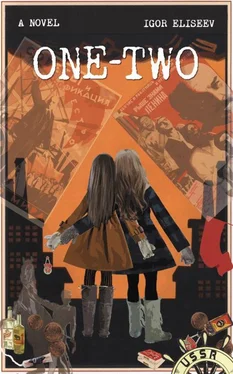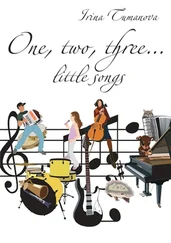When we returned to our usual room, nobody said a word about what had happened. Everyone forgot quite successfully how we had stolen sweets and then had taken all the blame for the sake of Sprinter. Of course, we didn’t gain the family we had been promised. I expected them to say at least a couple of words of thanks, but there weren’t any. Since that day we have never set eyes on the nurse who did electrophoresis; rumor has it that she got a job elsewhere. Our life turned into one long, meaningless day, and every following year was no different from the previous one. But nevertheless there were some changes that seemed unnoticeable: the meals were getting worse and worse and the CCP’s more and more rackety and mean. They boozed up with the personnel without scruple, arranged frequent drinking parties at night in the gym, and blatantly skipped classes, not forgetting to mock us in their spare time. We spent most of our time in the library, hiding from our so-called family. Nobody ever peeped into the reading room, and we could sit there quietly for hours reading books or flipping through pages, sometimes for no reason at all. Soon you began smoking, and I, previously having been categorically opposed to this addiction, followed your lead after six months. We obtained cigarettes by washing others’ clothes with our four hands.
Literally, from the very first day in the foster home, we had got the message: the more miserable a victim was, the more ruthless was the attitude towards him or her. But there was nothing to be done about it; other people really needed that way of asserting power! However, their bullying was not sophisticated: they beat us, spat on us, and wrote humiliating inscriptions on the walls, showing, in general, their innate and idiotic lack of imagination. Thus, we easily anticipated almost all of their mean acts and kinks, with rare exceptions only. You know, when you are warned, it feels like you are protected, so we weren’t hurt that much and at times we were even proud of ourselves and of our ability to foresee events.
The following year everybody in the foster home started talking about the significant changes to our country which were known as Perestroika (Perestroika – general name of reforms and new ideology of the Soviet management used to designate great changes in the economic and political structure of the USSR. Reforms were developed by the order of Yu. V. Andropov, the Secretary General of the Central Committee of the Communist Party of the Soviet Union, and initiated by M. S. Gorbachev in 1985. Perestroika is considered to have started in April, 1985). Nobody knew the meaning of the word and nobody took any interest in it, so what we knew was just rumor, but who actually could we discuss it with, given our situation in that solitary unsightly “cripples and freaks home” run by a corrupt power?
Sprinter had successfully graduated from a ten-year school and enrolled at a technical school for weaving; she was as proud of herself as if she had won a gold medal in the Olympic Games. Her parting ceremony was very peculiar. During the lunch Wash’em’Clean hastily approached her table with his usual hobbling gait, followed by Seamstress, Ragbag and Snot. Lately, they had taken to hanging out together.
“Ah-are you l-leaving us, you limped th-thing?” Wash’em’Clean uttered, licking his cracked lips. He had a strange speech impediment; it was neither mumbling nor stammering, more a queer combination of the two. Sprinter nodded complacently.
“I guess, we will never s-see you again out-t-side the place?”
“I don’t think so,” she said, and, as she had finished her portion of mashed potatoes, moved her plate aside.
“W-well, g-go to h-hell then!”
Like a huge spider hanging over the table, he bent over and spat in her tea, with relish. Everybody who was present in the dining-room, including cooks and caregivers, went deadly silent. One by one, other participants of the “procession” came up to Sprinter’s table and also spat in her glass in turn. The most abundant spit was Snot’s; she was the last one and had probably been accumulating saliva for a long time.
It always turns out this way: at first people idolize you, swear to be your faithful friend forever, and then they spit in your tea, and on your soul, too.
Sprinter was obviously at a loss. Having raised her shoulders high and biting her lower lip, she trembled all over, either with indignation or with fear, and could do nothing. We didn’t believe our eyes. How could it be that for all this time, all her bold actions were masks to hide ordinary fear and lack of self-confidence? Once the spitting was over, the red-haired Sprinter got up and, not looking at anybody, headed for the exit, accelerating like a real sprinter! We thought we had seen the last of her.
Those days our life didn’t seem as ugly as I came to see it afterwards. That’s why we didn’t even think of how detestable it actually was when Adoter, using the opportunity to be awarded for originality, took us to her countryside house to show us to her friends and relations. Imagining ourselves astronauts looking for life on another planet, we were pleased to perform our new “duties”: we served food and drinks to the guests and cleared away dishes, serving as some kind of a gaping-stock. The table in the living room laid with heavy plates was literally groaning, standing firm on its thin legs only by a miracle. There were dishes with crabs and salmon, several plates with black and red caviar, vases with oranges and even a pineapple. But we always looked at sweets only. Our “service”, however, didn’t last long; soon, the idle curiosity of the guests was replaced by acrimonious irritation arising from our deformity; and the principal “dismissed” us at once. For the rest of our life we remembered this fantastic table which we hadn’t had the luck to taste a bit from.
We were already in the last grade when a newcomer appeared in the foster home. He had been accidentally run over by a car, and afterwards got on to the operating table. Despite a series of surgical interventions, he remained paralyzed from the waist down. He wasn’t able to attend an ordinary school anymore and could not afford home-schooling either: he had no father, and his mother worked as a cleaner, washed the floors of entrance halls in apartment buildings. Adoter, without thinking twice, nicknamed him Disaster, quite up to her shameless style. We met him in the library for the first time. He was moving in his wheelchair between racks of books, his expression thoughtful. Upon seeing us, he immediately drove to our table and smiled in a lively manner.
“Hi! I have already heard about you.” He spoke very straightforwardly as if he had known us all his life. His face was distinguished by large eyes, beautiful in a feminine way; his neck was crossed by a scar, a mark testifying to an attempt at suicide. “My name is Sasha.”
“They call us One-Two. And what name did they give you?”
“My name is Sasha for everybody, with no exceptions. I don’t respond to nasty monikers. So, let’s start once again. My name is Sasha, and you are…?”
“Hope and Faith,” we corrected ourselves, not fully understanding the strength bestowed on this person whose health and fate were broken but not his spirit.
“How many pillows do you have on your bed?”
This unexpected question baffled us at once; at least, it sounded very unusual within the walls of a foster home.
“One.” We exchanged glances.
“Certainly, I knew it.”
“But it would be great to have two,” I said regretfully, suddenly realizing how full of injustices was our situation.
He nodded knowingly.
“So what is the problem? Are you going to sleep on one pillow for the rest of your life? And think about that disgraceful staff. Their lack of brains is not a serious problem, but they have no conscience either. And why is that old TV standing in the assembly hall when it’s broken anyway?” (Actually, the TV had been operable and used to gather a large audience around it in the past.) “And this blistering cold. It is already late November, and the rooms are not heated yet. Are they intentionally tormenting us, in order not to show us any mercy? They’ll keep making it worse.”
Читать дальше












